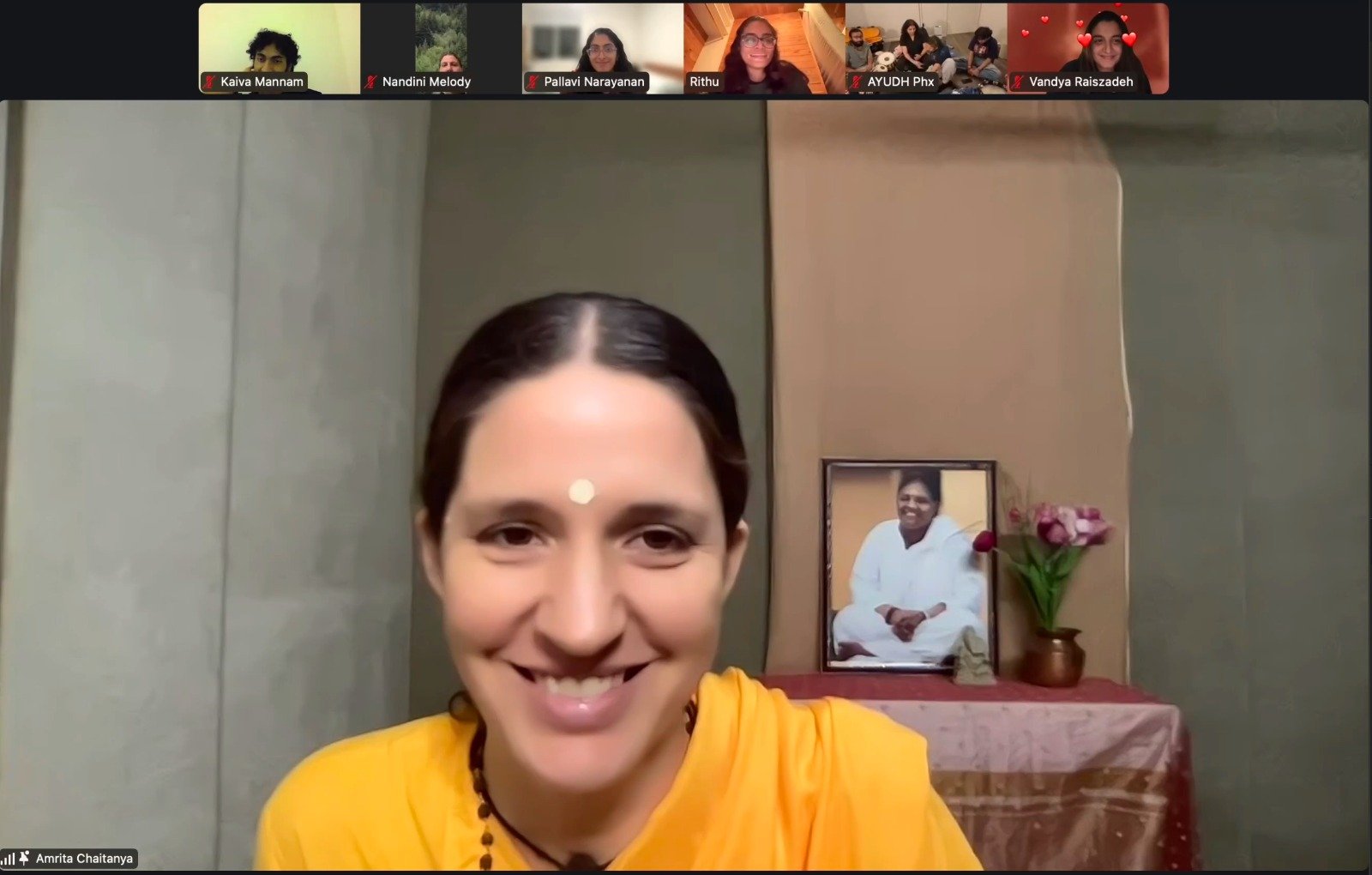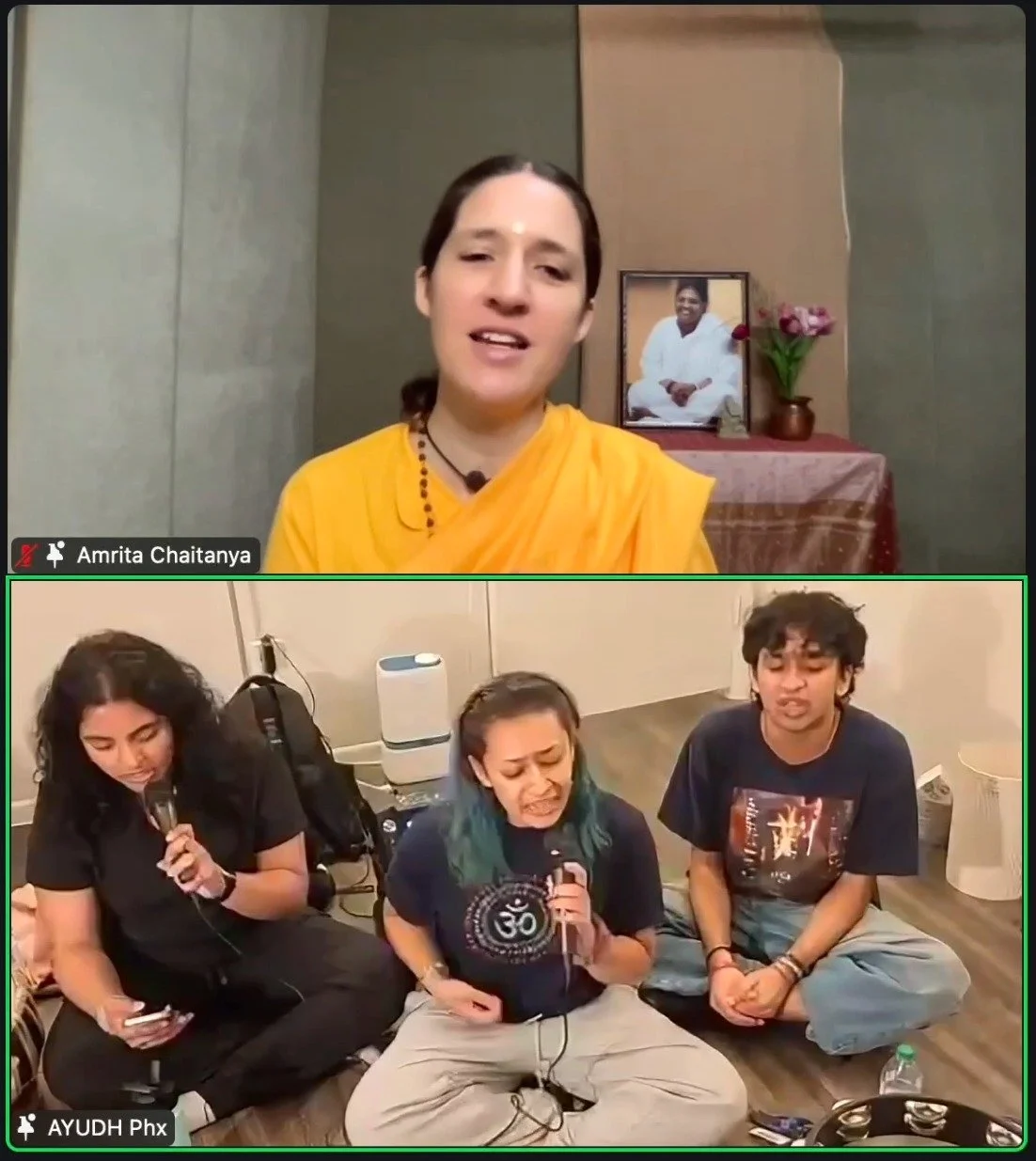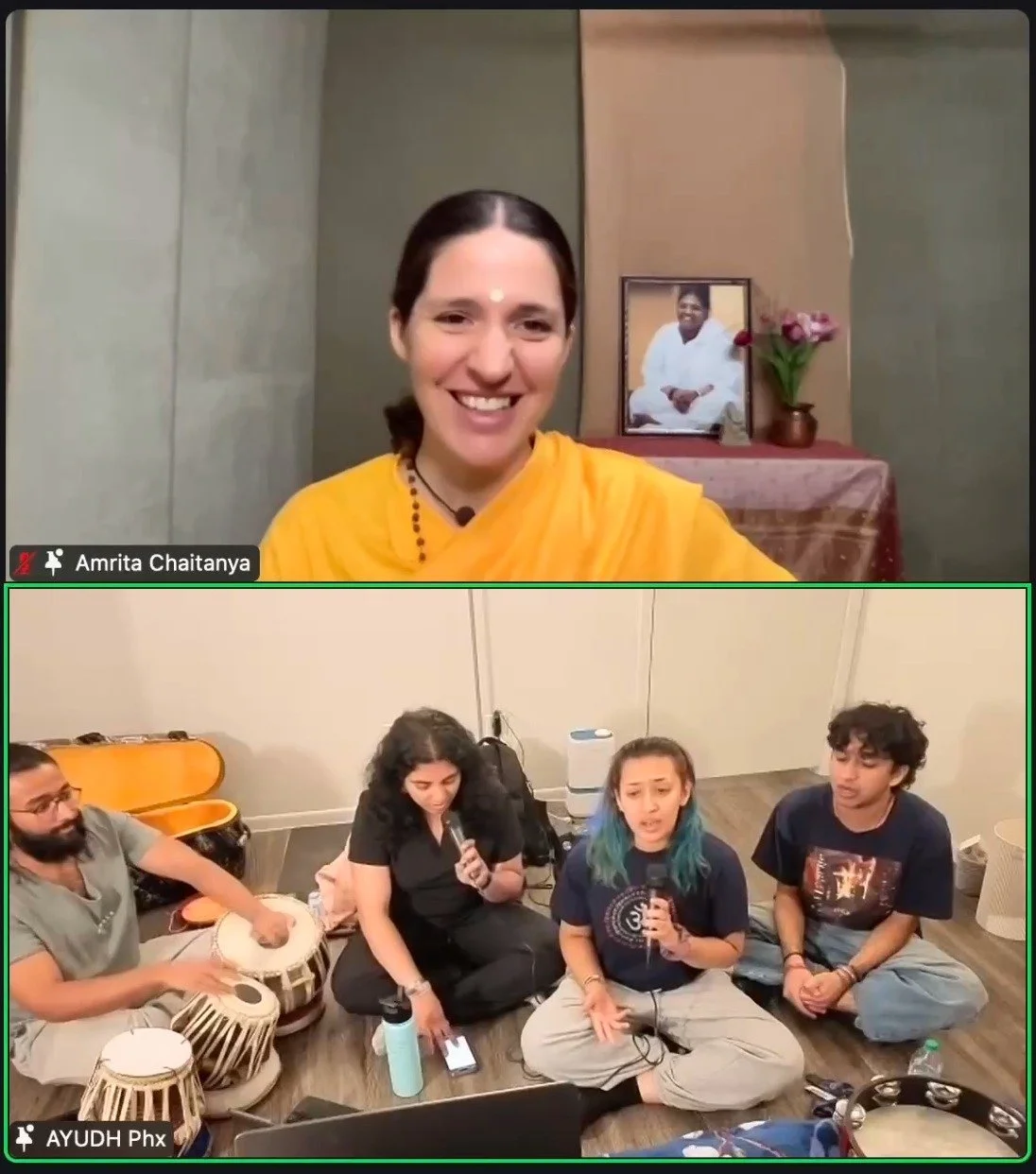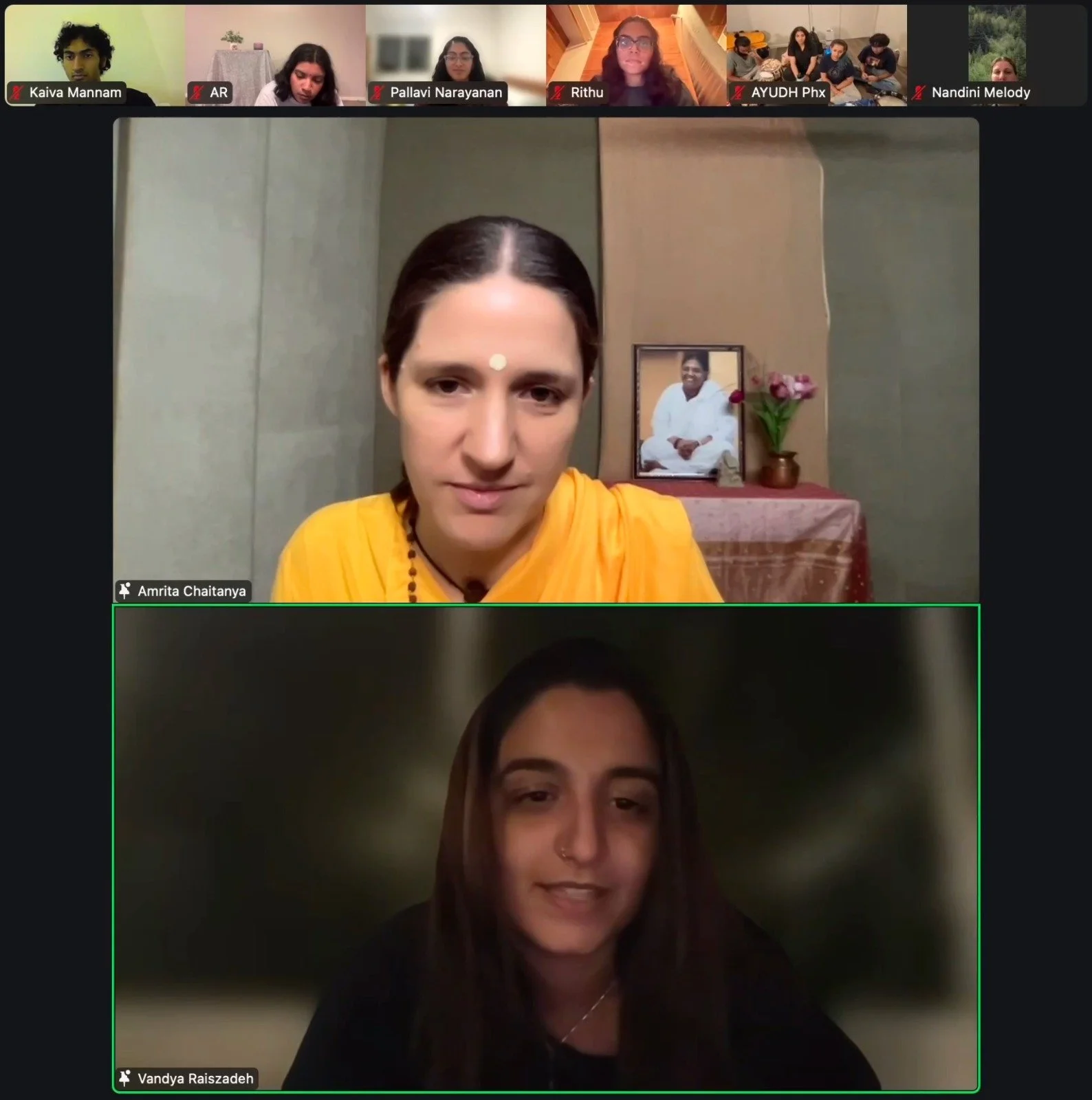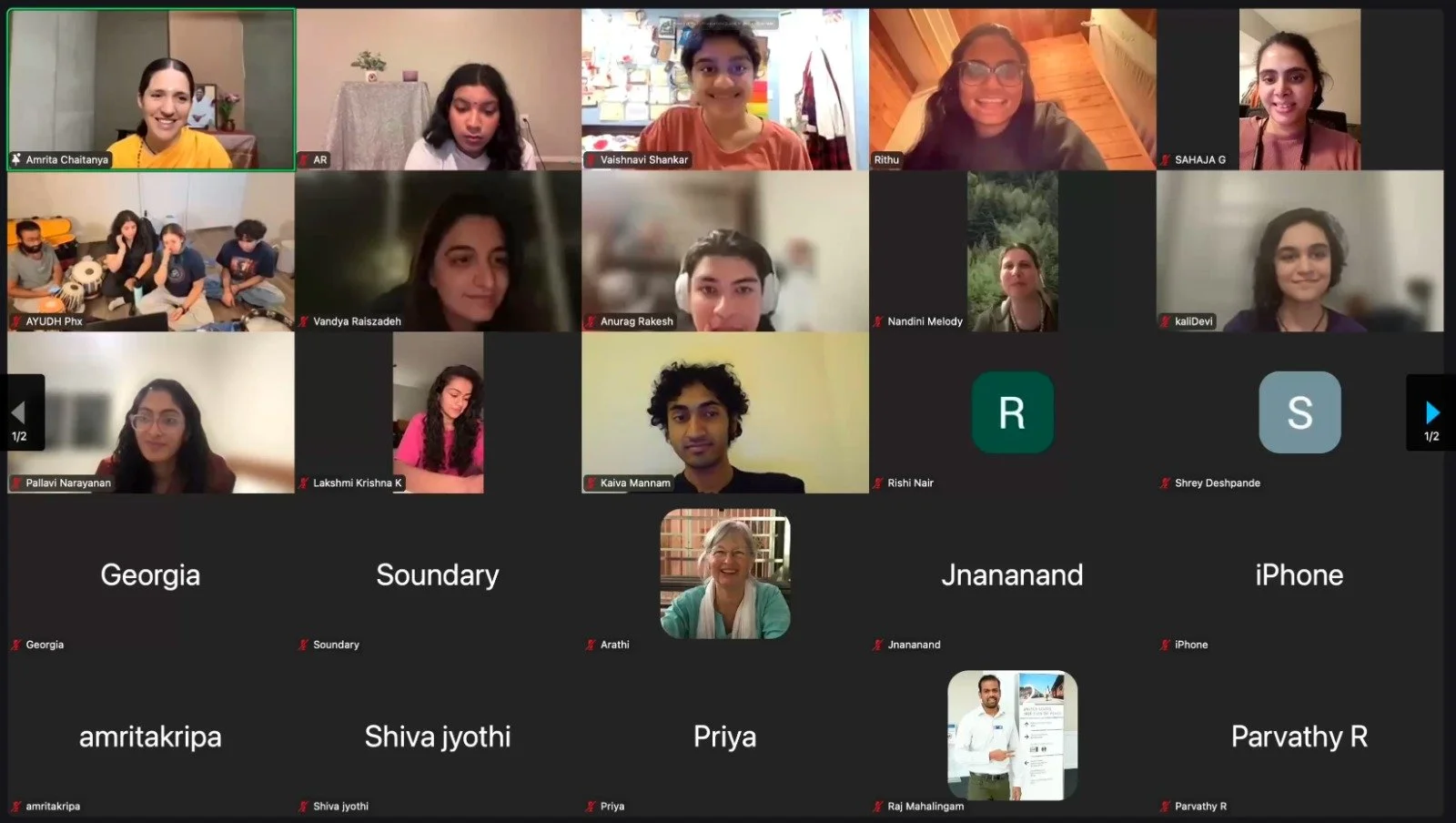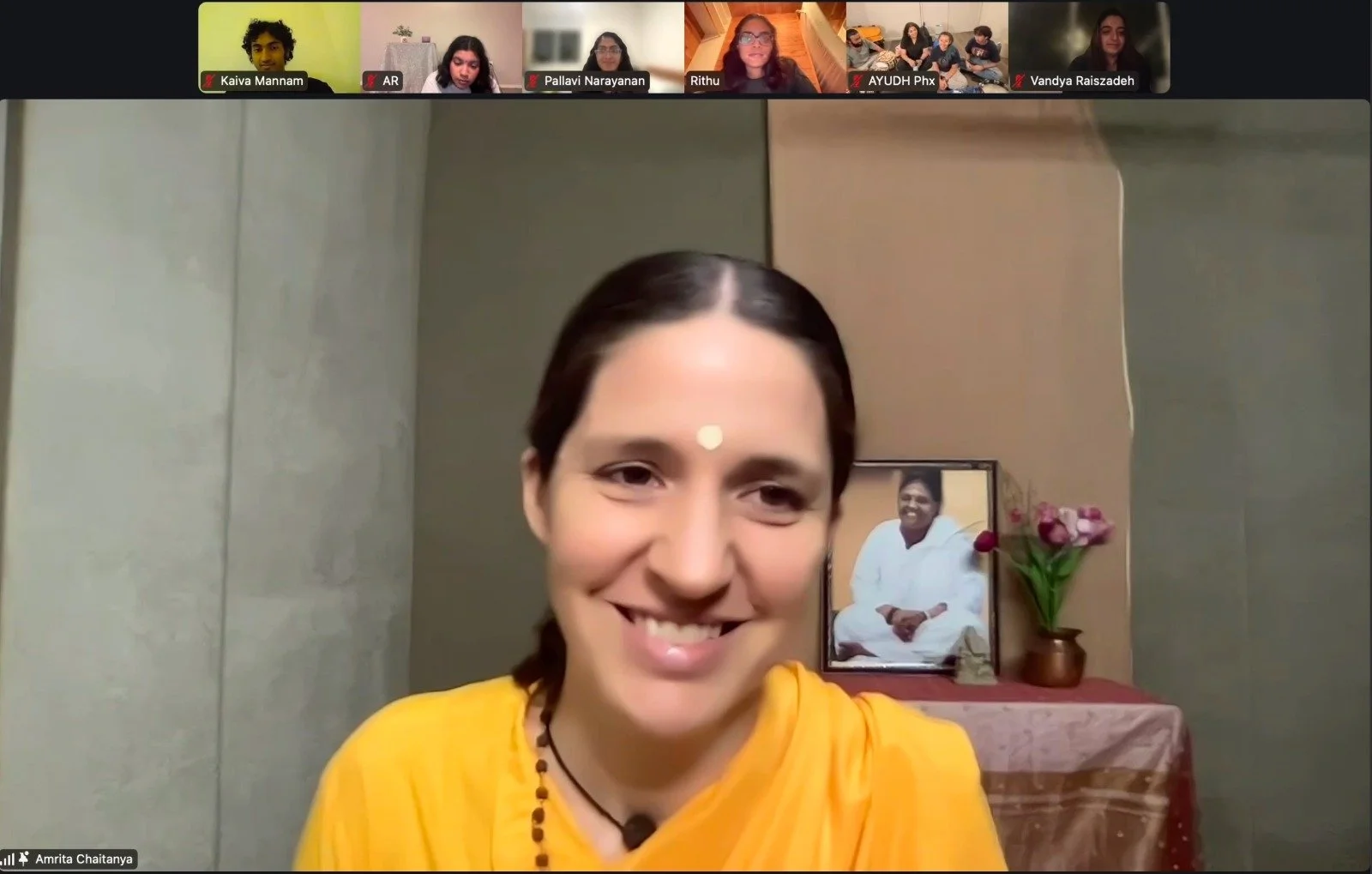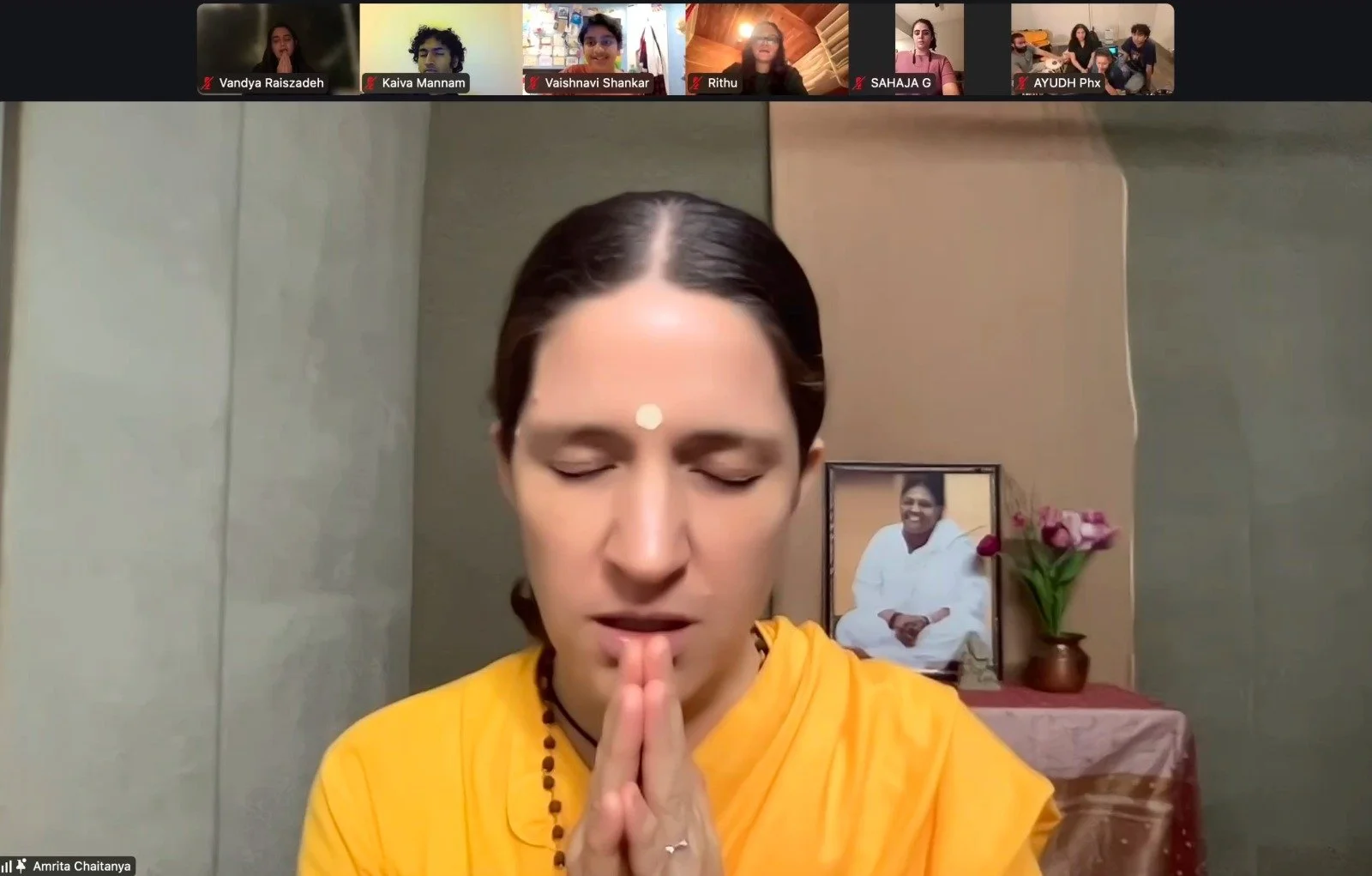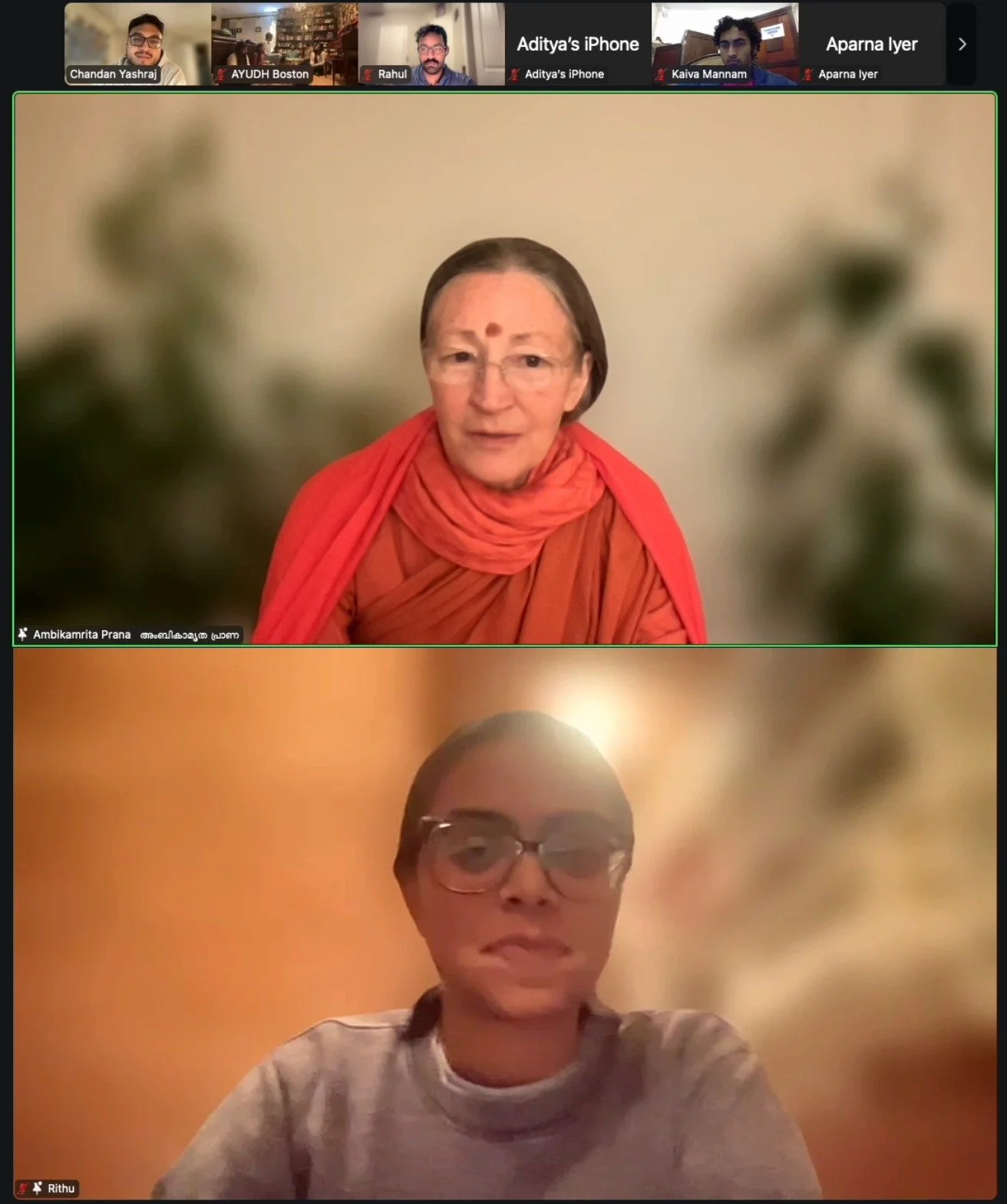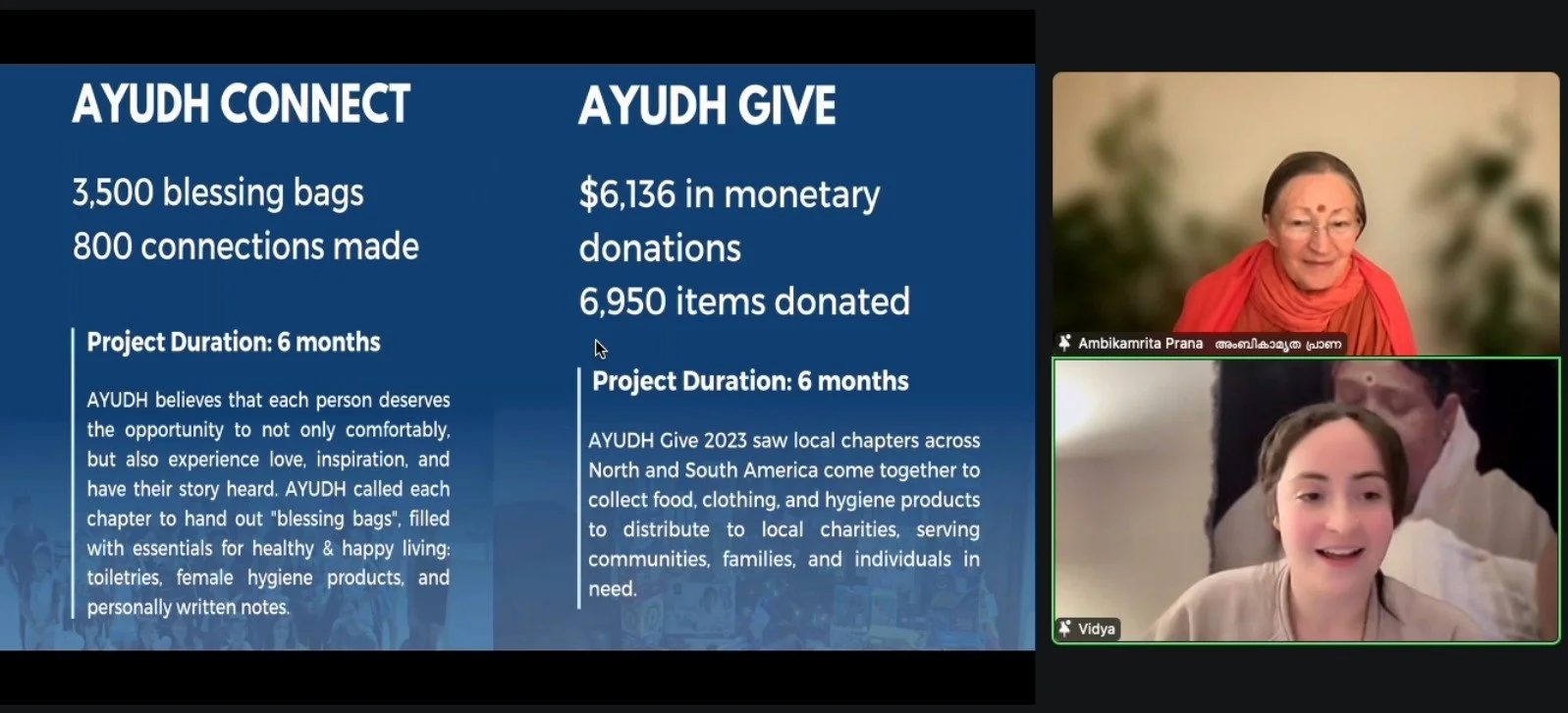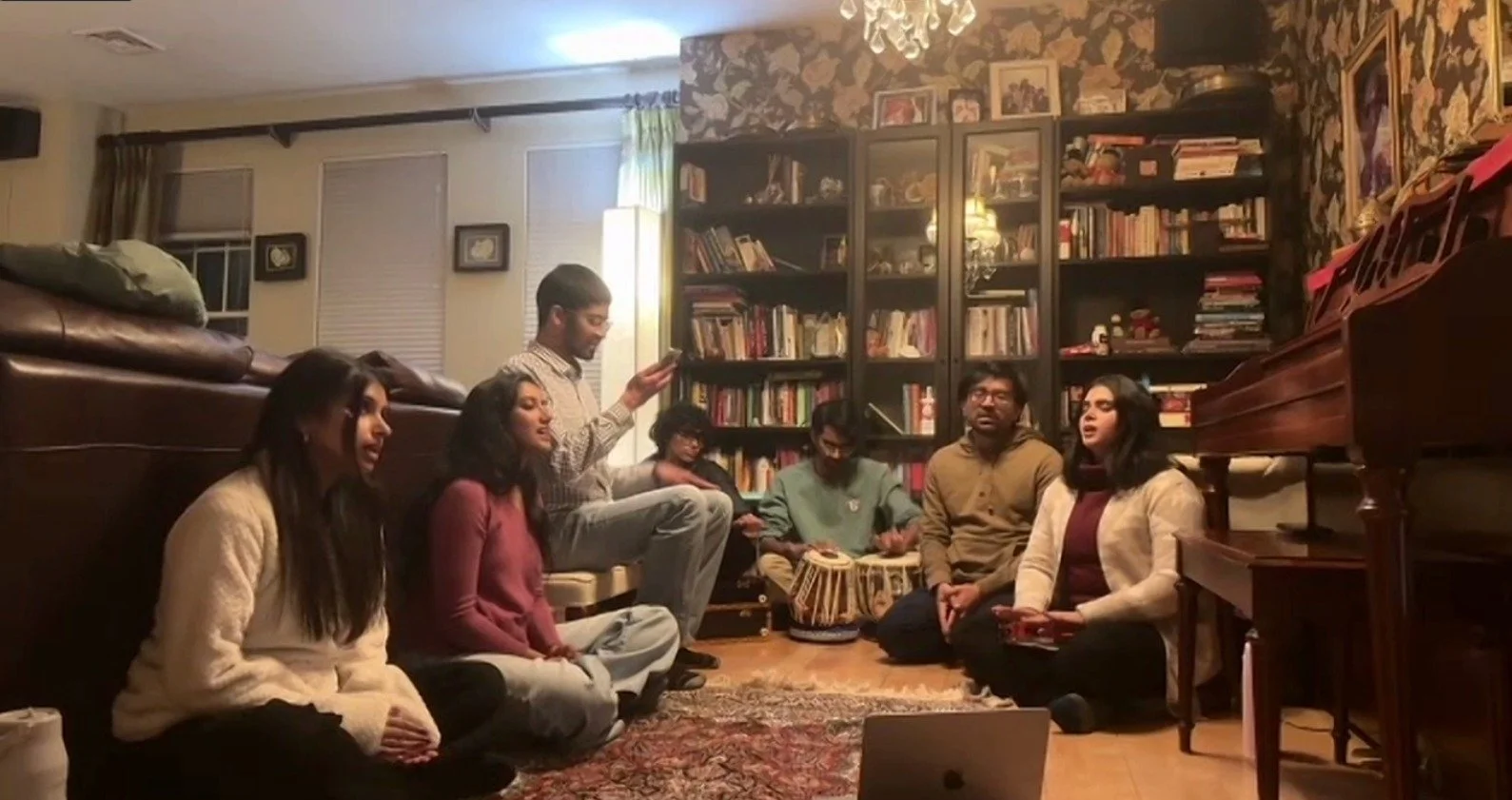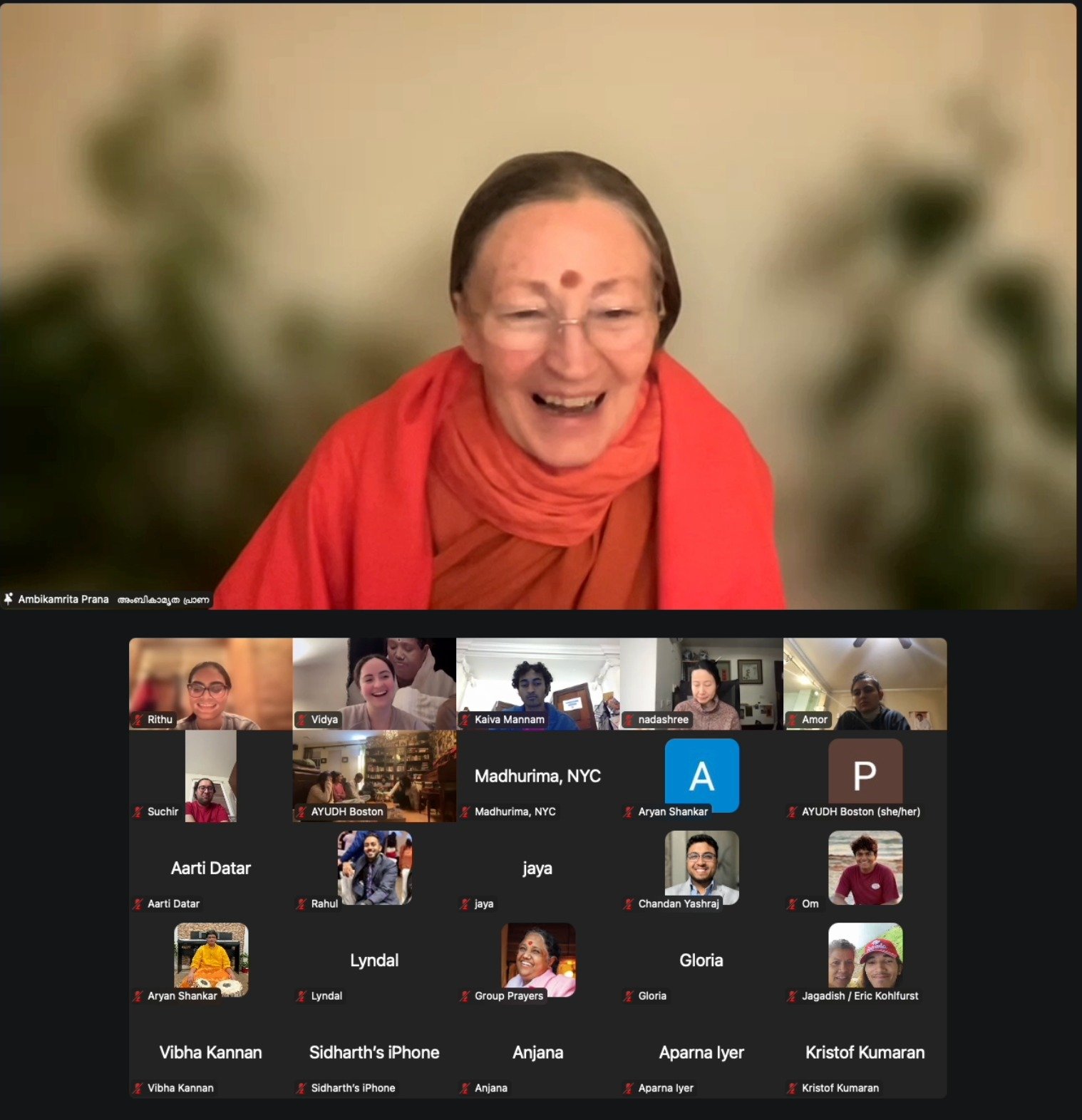AYUDH Reflect- a mindfulness initiative
AYUDH Reflect is a monthly meeting of young minds with Br. Ramanandamrita Chaitanya. Each meeting will consist of the following:
Meditation
Discussion around a relevant topic for young people in the world
Breakout rooms to get to know other AYUDH members better and share about what we’ve been going through in the past month
A bhajan sung by Br. Ramanandamrita Chaitanya
Stay tuned for details on the next AYUDH Reflect!
We look forward to seeing you there!
AYUDH Reflect Discussions
May 16, 2025
Click Here To Watch The Video!
In a heartfelt and practical conversation on anxiety, Swami Dayamritananda and Br. Madhavamrita Chaitanya shared spiritual insights with a youth audience, highlighting how anxiety is both natural and manageable. They explained the difference between helpful and harmful anxiety, stressing the importance of self-awareness, physical and mental well-being, and the role of spiritual practices in calming the mind. The Swamis emphasized that a noisy mind—rooted in past regrets and future worries—is the source of anxiety, and that mindfulness, breath awareness, mantra chanting, and time in nature can restore inner peace. Practical guidance was also offered on managing outcome-related stress, digital addiction, parenting challenges, and anger. The Swamis encouraged surrender to a higher power, daily meditation, and serving others as paths to transform anxiety into growth, connection, and peace.
Watch the video above for the full discussion or read our detailed notes here!
April 15, 2025
Click Here To Watch The Video!
In this reflect, we were joined by Bri. Amrita Chaitanya, who led us in a discussion about planning for the future while surrendering. She explained that while we may be faced with anxieties and insecurities regarding the future, the most important step we can take is to have an anchor that holds us throughout all the changes we may face. For us, the most stable anchor is our beloved Amma, the divine. We have to work on surrendering to her will and putting in efforts to build our relationship with her to build our mental strength. Putting aside even a couple minutes to complete your mantra, or chant, is like adding a brick to a wall. With time, our spiritual anchor will strengthen, and we will be more able to handle all of the suffering and obstacles that may come our way. We had a wonderful talent showcase from Amrita, who serenaded us with her flute, followed by a Q&A session, and a beautiful bhajan, Vagadisvari, from AYUDH Phoenix.
Watch the full video in the above link or read our notes here!
march 18, 2025
Click Here To Watch The Video!
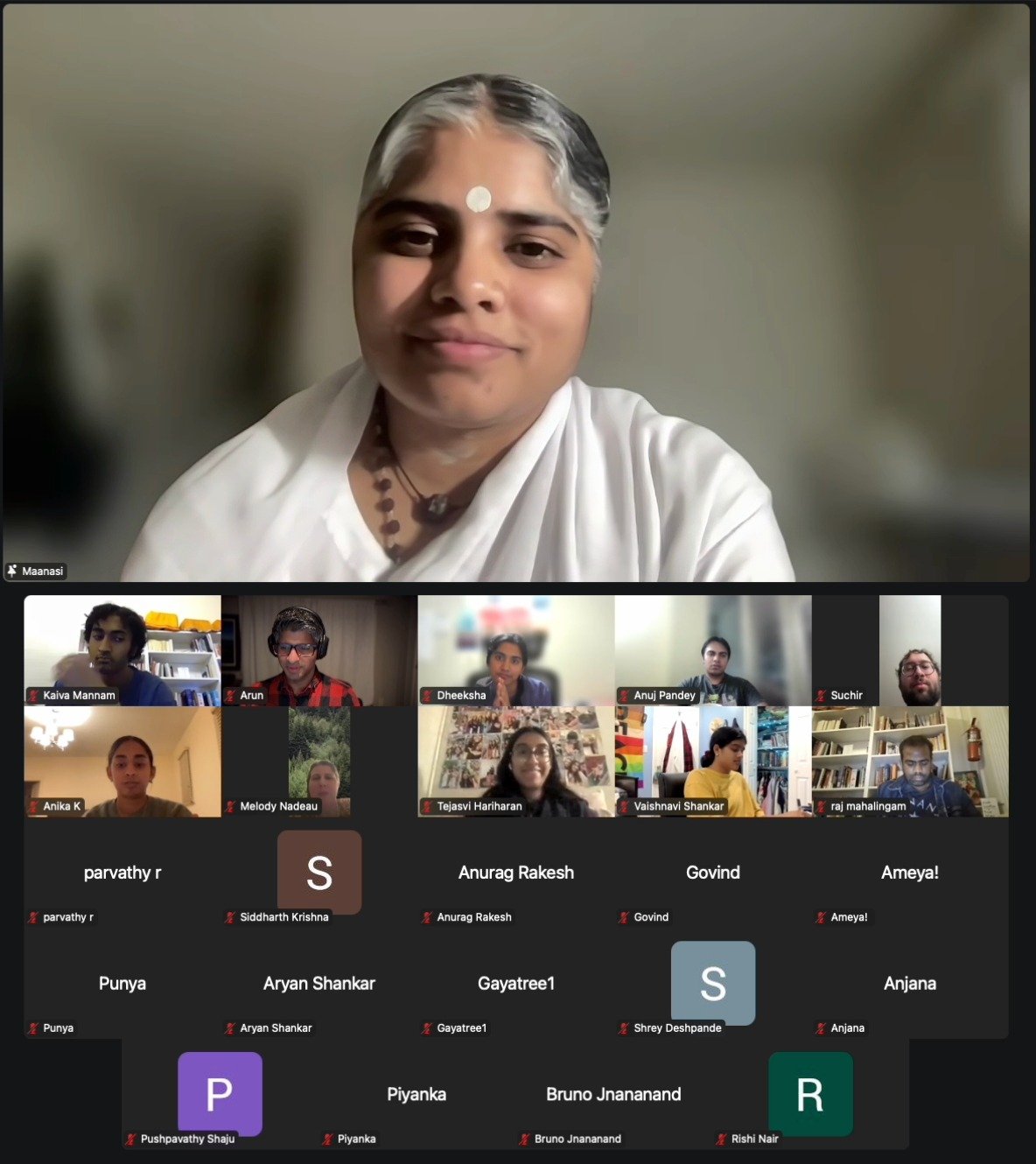
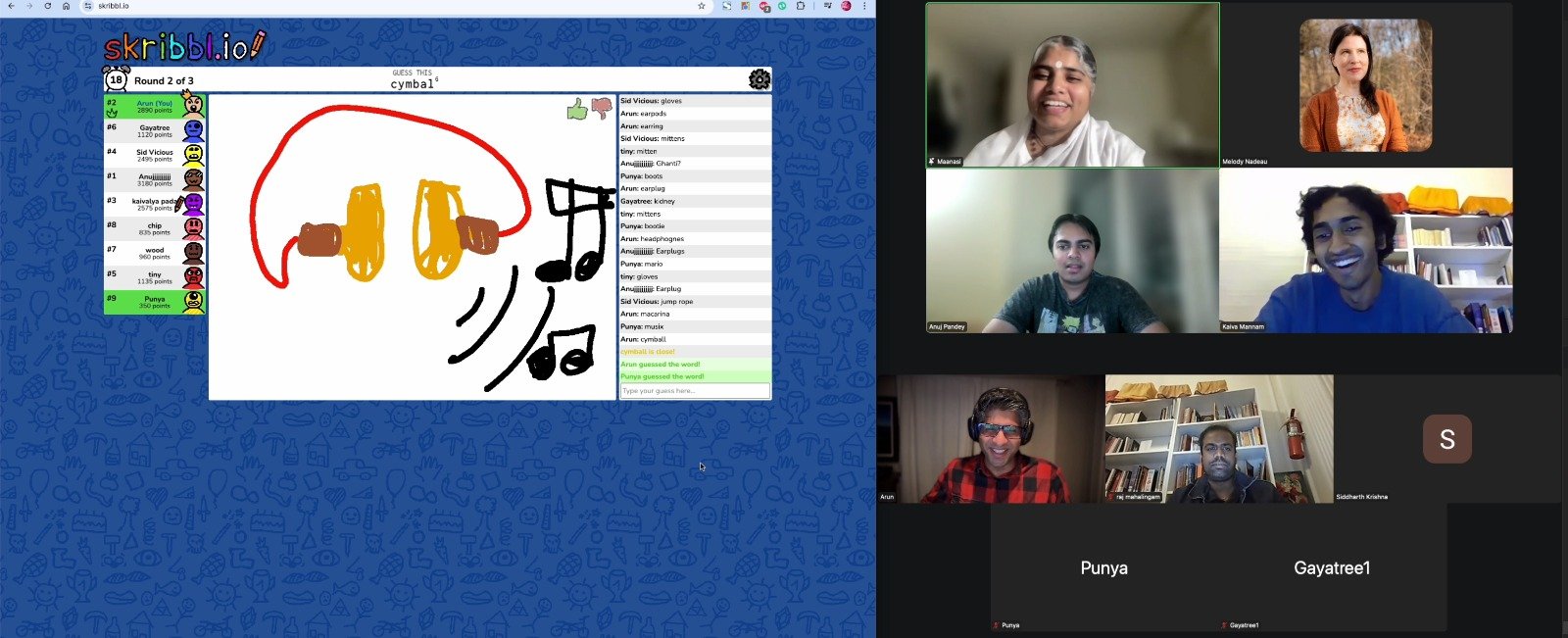
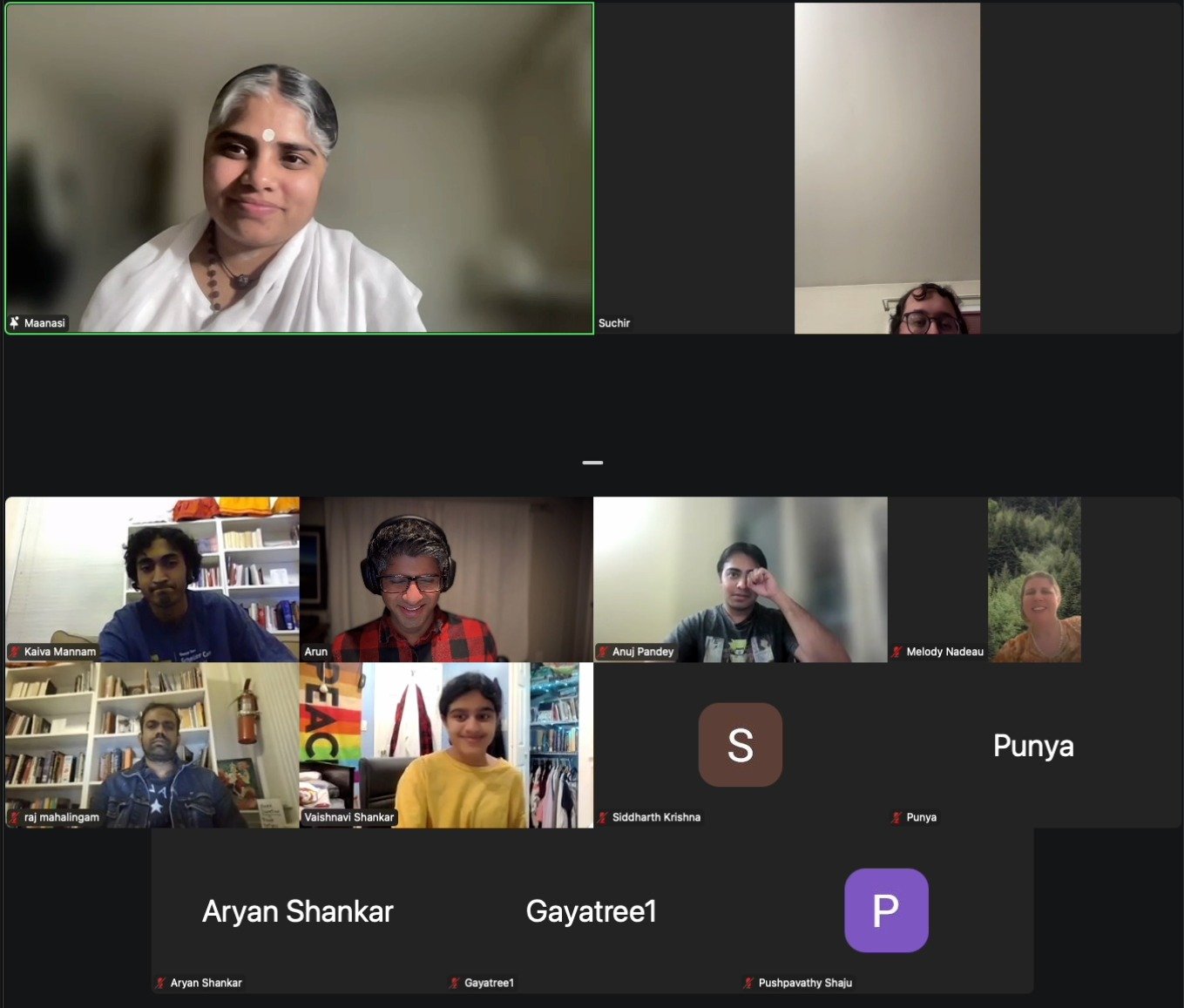
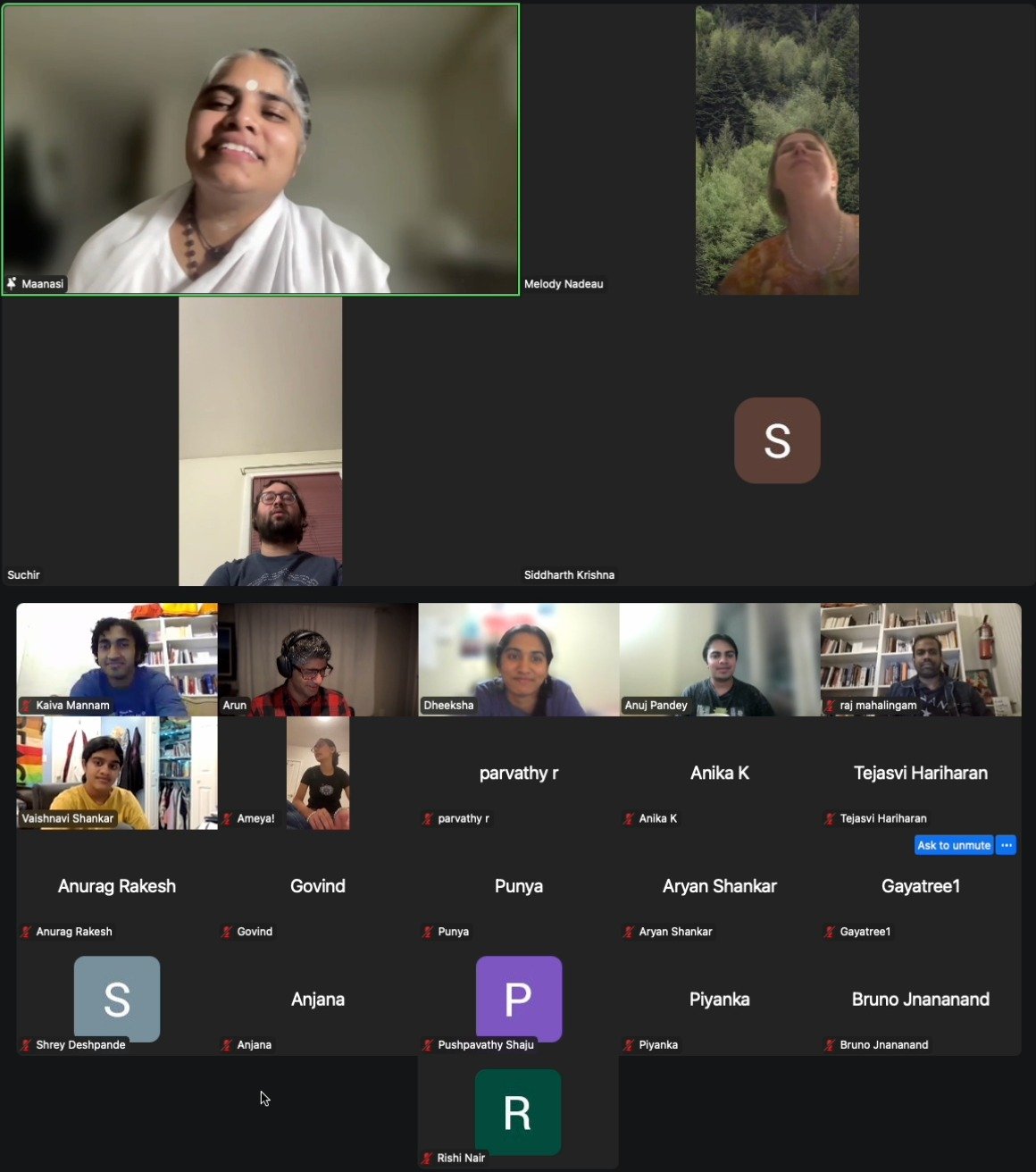
For this reflect, we were lucky to be joined by Bri. Maanasi, who used her knowledge of Ayurveda to expand on the topic of mind and body health. She explained that in Ayurveda, health is defined as a state of balance between the bodily functions, soul, senses, and organs. Continuing, she said that disease are determined to arise due to three different causes: abnormal use of our senses, the passage of time/karma, and knowingly committing mistakes. Achieving true health requires finding balance in both physical and mental actions and making beneficial choices even when they may not align with immediate desires. We continued by engaging in small breakout rooms, which was followed by a brief Q&A session. Finally, Bri. Maanasi concluded the session by leading a wonderful bhajan.
Click the link at the top to watch the video or click here to read the notes of our session.
February 18, 2025
Click Here To Watch The Video!
This reflect, we were honoured to have Swamini Ambikamrita Prana present to speak on the topic of making ethical and sustainable decisions in the modern world. She encouraged us to maintain an understanding of the selflessness of Mother Nature. Swamini explained that although making big changes can be difficult, starting with smaller steps like buying in moderation or volunteering with environmental groups is an important way to start. Following a short Q&A session, we brainstormed future project ideas, and Swamini expanded upon and provided ideas to improve the initiatives. The reflect concluded with a lovely bhajan from Boston AYUDH.
Click the link at the top to watch the video or click here to read the notes of our session.
January 22, 2025: How to have self-compassion





Swami Dayamritananda Puri gently guided us in reflection on self-compassion and self-kindness. He reminded us to seek the middle path and avoid either extremes as a form of self-kindness. We are all growing and have weaknesses and strengths. Swamiji encouraged us to be kind to ourselves and accept ourselves for who we are. Everyone makes mistakes. Finally, Swamiji answered seven of our questions after we had time to contemplate on his satsang in breakout rooms and concluded with a bhajan.
Watch the above video to see his full satsang and read our notes here.
December 20, 2024: Ayudh Unite + Reflect, collab with AYUDH APAK and Americas
We had an incredibly special AYUDH Unite & Reflect with Br. Madhavamrita Chaitanya and Br. Ramanandamrita Chaitanya, in collaboration with AYUDH Asia Pacific and Americas. The topic was something very close to our hearts: How to feel Amma’s presence when we we’re not physically with her? Both Swamijis lovingly answered 9 questions from us and shared many personal stories and cherished experiences with Amma. We started this special event with a silly rapid fire question game with the Swamis and concluded with Abhishta Varadayike as our concluding bhajan. Please read our notes from this session here and watch the video above.
November 19, 2024
In November, Br. Ramandamrita Chaitanya continued to address some of the challenges we raised during last month’s discussion on navigating change. See the videos above for Ramanandji’s answers to these challenges and follow along in this document.
Also, a special thank you to Divya Ramachandran for spreading her infectious love for photography with us during the talent showcase! You can see more of her work at https://nowandforeverphotographybydivya.pic-time.com/client
October 15, 2024
In October we discussed the topic of staying rooted to our principles during change. We all have to face changes in our environment or circumstances. Ramanandji shared his own personal experience with changing his PhD from India to the US. Afterward he gave us 4 pointers to remember when we are faced with change.
TLDR
We are who we are. We are not what we think what other’s think we are.
Maintain connections
Spend time with yourself
Be ready to embrace change
Be clear about our boundaries
Discussion
Br. Ramanandamrita Chaitanya shared his personal story of coming to the US to do his PhD at the University of Maryland. When he started his degree in the Coimbature campus, Amma called him one day and said “Amma is sending you to the US”. This came very unexpectedly and would send him to a place surrounded by many changes including a different culture and friends. He felt he was going to a place where he doesn’t know anyone and is very far away from home. In the ashram he has all the Br.s and Bri.s, but first few months he came to US was very unsettling. During this time, he asked himself the following questions
Am I trying to change myself to fit into the environment or am I trying to fit the environment into me? It is better to approach change with the latter mindset. I shouldn’t try to change ourself so much that I lose who I am.
Am I being “me” or “myself”? “me” is more objective (trying to fit myself into the environment). “Myself” is more subjective (trying to imbibe the surrounding into my stride). I should be comfortable the way I am. Try to make others comfortable the way I am also.
Four Points to Remember When Facing Change
Point 1 - Maintain connections
try not to lose the connections you already have (ie with your parents, past, Amma family). Ie you can have video calls etc. anytime now to maintain these connections
try to feel excited about the new connections we are able to make (but still be concerned about what kind of connections, with whom, etc)
we should always try to have one person, like a mentor, who we can talk to whenever we feel lost
Point 2 - Spend time with yourself
try to also spend time with our own selves and maintain connection with ourselves (meditation, read a spiritual book) which helps us delve within
can always have a space where you feel comfortable (your room, a specific place, etc) and whenever you feel uncomfortable, you can be there
Point 3 - Be ready to embrace change
There will always be change. Instead of rejecting change, we should learn how to embrace it.
All change will have positive and negative effects. We should focus on the positive. If we focus on the negative, the only person who will lose is me.
Have an open mind and focus on the positive changes that happen, be realistic about our expectation
Point 4 - Be clear about our boundaries
As we deal with new environment/people, be clear about defining our boundaries (our abilities and disabilities)
Be clear about what my do’s and don’ts are. We don’t have to be aggressive about it but be clear
Ultimately, we come back to the recurring point from earlier sessions: We are who we are. We are not what we think what other’s think we are.
In addition to Ramanandji’s satsang and discussion, we learned about modern music composition from Keshav Krishna, in our second ever talent showcase!
May 21, 2024
Discussion:
In May's AYUDH Reflect session, Br. Ramanandamrita Chaitanya shared his insights on the nuanced differences between being alone and feeling lonely, illustrating how these states affect our well-being and perception of the world around us.
Ramanandji, despite his monkhood which often entails solitude, considers himself immensely fortunate to be in the company of many supportive individuals. He highlighted an important distinction: though he often finds himself alone, loneliness does not touch him. Ownership, he notes, is not about possessing things but appreciating them and realizing the support they represent. This brings us to the heart of the matter: solitude is not merely a state of being; it is a state of mind.
Understanding Solitude and Loneliness
1. Solitude as a State of Being:
Solitude, according to Ramanandji, is a physical reality, imposed by circumstances but not necessarily a cause for despair. In contrast, loneliness is a mental state, often self-imposed, where one fails to appreciate the presence and support available. This lack of appreciation can lead even those surrounded by wealth and companionship to feel isolated or detached, potentially leading to severe emotional distress.
2. The Role of Self-Perception:
The feeling of loneliness can intensify when we focus too much on 'me' and 'my needs.' Ramanandji encourages broadening our perspective, citing a verse from the Bhaja Govindam by Adi Sankaracharya, which suggests that joy comes not from external company but from an internal connection to the essence of life or one's spiritual focus.
3. Practical Realities of Life:
Life demands that we confront many of its challenges alone. Ramanandji uses everyday examples, such as dealing with hunger or illness, to illustrate that, fundamentally, we all face life's trials individually. However, recognizing this shouldn't lead to despair but rather a cooperative spirit in our shared journeys.
Balancing Acceptance and Expectations
Ramanandji further delves into how our happiness is governed by the balance between acceptance and expectation. High acceptance can lead to complacency, while low acceptance might breed resentment. Similarly, high expectations can set us up for disappointment, whereas low expectations could result in a lack of motivation. Finding a balance between these extremes can enhance our joy and appreciation of others, thus mitigating feelings of loneliness.
Through these reflections, Ramanandji suggests that solitude, when embraced as a blessing, offers profound opportunities for personal growth and spiritual deepening. Instead of viewing solitude as a burden, it can be seen as a powerful tool for self-discovery and fostering deeper connections with the world. In doing so, we can transform our solitary moments into enriching experiences that fortify our connections and enhance our overall well-being.
April 16, 2024
Discussion:
In April’s AYUDH Reflect session, Br. Ramanandamrita Chaitanya discussed how we can deal with handling many tasks at the same time.
He broke it down in 7 points.
1) Try to understand that life is not so complicated. It’s our point of view that makes it so complicated.
2) Face the problem. We tend to deal with situations in one of two ways:
Overcomplicate situations and look for a means of escape
Underestimate situations and decide not to work on them at the moment
3) Try not to procrastinate. Whether tasks are simple or complicated, it’s always better to face things earlier. Things will always get more complicated the more we procrastinate.
4) Try to focus on the core problem. In many cases, we’re busy addressing peripheral issues. We need to stay in the present and not get caught up in peripheral things around the main issues.
5) We can primarily handle 1 thing at a time. Computers behave this way, and our brains are similar. The more we try to handle, our brain switches between problems - leaving us tired in the end. In the case of large tasks, we can break them into smaller tasks and handle things one at a time.
6) Our attitude is the most important thing in any situation. Unless we have the right attitude, we’ll find that problems will keep resurfacing and never get truly resolved.
7) There is always a higher force and things beyond our control. No matter what we’re trying to do, remember that things may not go the way you expect them to.
Bhajan: Jaya Jagad Janani
Game: Connections
March 23, 2024
Discussion:
March was a special AYUDH Reflect session. AYUDH Americas was joined by Swami Amritaswarupananda Puri for a discussion on the importance of the Bhagavad Gita in our lives.
Read more about the discussion in our blog article - Blog on Swamiji’s Gita message
FEBRUARY 20, 2024
Discussion:
In February’s AYUDH Reflect session, Br. Ramanandamrita Chaitanya kicked off with the question, “How can we maintain healthy relationships with friends, family while controlling attachment and managing expectations?”
After opening up initially to the audience, they had the following answers including listening, honesty, understanding that both people are not perfect, lowering expectations, the fact that conflict is a part of all relationships - see it as an opportunity for growth, asking ourselves “what would Amma do?”, and finally, rather than what I want — what does the situation need?
RamanandJi then began his response.
All entities in a relationship are, in some way or another, attached, even planets in a solar system by gravity. Attachments are an inevitable part of our life and world - our friends, our families, workplace colleagues, the food-web, relations between countries. You CANNOT deny the fact that attachments and relationships exist. According to The Science Journal, relationships play a very important role in our overall well-being. Having good relationships lowers the risk of physical diseases and ailments.
Ramanandji had a classmate who was a girl, and a friend, in 2nd grade. The girl gave this idea: we should all study together, divide and conquer, and we all do the exam together. They did the exam together, and the girl told the teacher the boys were cheating. The teacher gave a big scolding to Ramanandji. RamanandJi joked that this may have put him on the path of Brahmacharya.
In the Roman Empire, during the 3rd century, is when the concept of Valentine's Day came about. When Roman soldiers were banned from marriage. St. Valentine would secretly help soldiers get married. RamanandJi then posed the question, “If its Valentine's day, how should one ensure it's the best possible day for your partner?” The foolproof approach is to give our partner the best possible gift, and expect the lowest possible gift from our partner.
Relationships are an equation between expectations and acceptance. Keep these two balanced, as expectations too high leads to dissatisfaction, while acceptance too high leads to being steamrolled - having them balanced leads to the perfect scenario.
Be realistic about your expectations and keep those in mind when you go about relationships.
1. Be practical: There is nothing called an ideal relationship: No relationship is going to be smooth, no matter who it’s with. Nothing is utopian in nature, and everything will have it’s highs and lows. We just need to be prepared for it.
When RamanandJi looks at his parents, they really shouldn’t have been together - no similar likes and dislikes, so many differences of opinion, but they made it work for 50 years. The bond they both had was so special. His father always thought how he can do things best to make things better for his mother - especially during her time of need with Parkinson's.
2. Communicate: How to handle a situation when things don’t go right? Communication is so important. We need to be open and honest. If we want to have long term meaningful relationships, it’s not just about me communicating to the other person, we need to be good listeners. Sometimes we just need to keep quiet sometimes too - talking is not always the best solution.
3. Respect: Accept the other person’s shortcomings - we can help them change and get better, but we need to accept who they are and respect them for the way they are. As Amma says, expect a frog to behave like a frog, expect an elephant to remain an elephant. We also need to respect their perspectives, not just shortcomings.
4. Support: Any relationship will be healthy and strong only when there’s a support system. When we support the other person, they will support us. In any design, when one supports the other, it is by nature that the other supports this as well.
When it comes to a situation, ensuring you first go through these three steps - forgiveness, reconciliation, warning - then we can react appropriately.
Bhajan: Jaya Jaya Devi Dayala Hari
Game: Skribbl!
January 16, 2024
Discussion:
In January’s AYUDH Reflect session, Br. Ramanandamrita Chaitanya discussed New Year’s Resolutions.
He mentioned the main reason that we don’t seem to stick to our new year’s resolutions over time as the mind tends to drift towards inertia.
Resolutions don't stick because of two things.
1) We’re unclear about WHY we’re taking the resolution.
2) We’re unclear about HOW we’re taking the resolution.
In order to stick to our resolutions, we need to have absolutely clear answers to these two questions. We can write them down on our phone, so that we’re reminded of them repeatedly.
The following points can help us stick to our resolutions as well.
1) Be positive
We all have the potential to achieve whatever we want, we don't recognize it, or we refuse to recognize it.
Edison failed hundreds of times, he only achieved success because he had firm conviction that he can do it.
It's not just a slogan, we need to actually believe that we can achieve our resolutions.
We need to develop a proper understanding and awareness of our abilities, and be self confident.
2) Be realistic
We need to ask ourselves: “What can I realistically do? What are my abilities?”
Just as we need to be aware of our abilities, we must be equally aware of our shortcomings.
3) Be specific
Be very clear of what the goal is
RamanandJi shared a story when he once told Amma he wants to fast for 41 days. Amma told him, “It’s better you eat healthy and help others, rather than not eat, fall sick, and make others take care of you. Why exactly do you want to fast?”
When asked that question, RamanandJi didn’t have an answer - demonstrating the power of a specific goal when it comes to resolutions.
4) Be ready
Be ready for factors under your control, environmental factors, and factors entirely out of your control.
RamanandJi shared another incident where he once thought he was being thoughtful by complimenting someone on her food, but it turned out it was actually cooked by someone who she was at odds with.
Similarly, we can take actions that we judge to be the best in the moment, but there can be factors outside of our control that we need to be ready for and accept.
5) Be joyful
At the end of the day, we should go through this journey with a smile on our face.
As Amma says, whether we laugh or cry, the days will go by - so it’s better we find a way to laugh and be happy as we go through life.
Bhajan: Durga Bhavani Ma
Game: Skribbl
December 20, 2023
Discussion:
In December’s AYUDH Reflect session, Br. Ramanandamrita Chaitanya discussed strategies for AYUDH mindfulness.
Some initial points that he mentioned were as follows:
Eat without watching any YouTube. One can enjoy the food much more if one isn’t distracted by other things.
It’s easier to stick the mindfulness practice if one is already engaged in action. It’s easier to go to spiritual practice from a state of action, rather than a state of laziness.
Challenges in Mindfulness
YouTube is a distraction which takes us away from mindfulness.
When stressed about a presentation, or ruminating about the past (not being in the present moment) makes us unmindful.
Not being physically active, makes the mind distracted. Doing physical workouts can energize and focus you.
Being stuck in your room, makes you stuck in your head.
One stress/distraction buster is watching something funny on YouTube. Watching YouTube is not detrimental, as long as we’re learning something new. Follow up with the learning. Learning things is a form of mindfulness.
Tips to be Mindful
Have a morning routine!!! There’s more receptivity to being mindful, if starting something mindful in the morning.
Gratitude journaling – realize that life is bigger than just me; there’s so much beauty in the little things.
Look through the window and see something random, draw it, and label what you draw. It calms your mind down and grounds you in the present moment.
Offer whatever you’re doing to Amma – attitude of surrender.
At night, focus on the things that did go well. Seek more gratitude in the simple things.
Mental visual exercise, think about a calm safe place, like a childhood ice cream shop.
Be strong!!
Ideas for AYUDH Mindfulness
Do something small to give your mind a win.
Take a shower for five minutes, once a week or so.
1% Change. Try to improve something about yourself by 1%.
Try engaging in regular sports activity with friends (like ping pong).
Meet up with someone in person rather than text.
AYUDH Discover
Learn something new about your immediate environment. Maybe have people snap a picture of it. Nature pic of the day?
Creating art.
1 new chore a day.
5-minute meditations.
Other Ideas
AYUDH Lift for physical strength.
AYUDH Thankfulness. Daily Gratitude.
Make your own meditation.
November 28, 2023
Discussion:
In November’s AYUDH Reflect session, Br. Ramanandamrita Chaitanya answered multiple questions from AYUDH members.
The first question was about social media, and it’s use when it comes to combating stress effectively. Br. Ramanandamrita Chaitanya answered as follows:
Sometimes when you watch a short video that makes you laugh – it can remind you how to be joyful in stressful moments. It can help in this case.
Our mind is a set of thoughts. Our mind is a piece of cloth, which is nothing but strands of threads weaved together. So when we start to take out each thought, the mind ceases to exist – the highest spiritual state. The mind wants to exist, so it always looks for more thoughts to generate – and social media is the perfect venue for this. So why do we get stuck to social media? There are a couple of reasons.
We get stuck to social media because of validation. It brings similar thinkers and people with similar hobbies together.
The algorithms of social media do a good job of understanding how you think, and start to feed you think that you like the most. This helps the mind get more satisfied.
It’s all about moderation – we shouldn’t be on this all the time.
The second question dealt with how and when to stand up for yourself in different situations?
First off, we need to understand the other person’s side. This will make things so much easier to interact with them effectively.
Br. Ramanandamrita Chaitanya told a story to illustrate this point.
A Mahatma come across a scorpion that’s drowning, and furiously trying to keep its head above the water. The Mahatma goes into the water and tries to save the scorpion, but once the scorpion is on the Mahatma’s hand - it immediately stings him and he drops it in pain. However, this doesn’t deter the Mahatma as he goes again to save the scorpion, and get stung again. This is repeated a couple of times before he manages to get the scorpion to the land safely. His disciple asks him, “Why would you try to save this scorpion after it kept stinging you? I would have let it die for hurting you to this extent!” The Mahatma responds, “What else would you expect from a scorpion? That is its nature, it’s the only thing that it knows. We can’t get angry at the scorpion and expect it to not behave like one.”
Similarly, if we can have this attitude when someone talks ill of us, we can have the thought – “Well, this is all they are capable of.” We need to show pity to them, instead of feeling belittled ourselves. In fact, if it helps us, we can even view them as inferior to us in order to allow the feeling of compassion and mercy to flow through us in these situations. We can utilize this attitude to help us deal with people who are abrasive and may otherwise rub us the wrong way.
There were further questions asked by AYUDH members throughout the session regarding how to deal with emotions and sharing various experiences.
Bhajan: Devi Daya Karo Ma
Game: Scattegories
October 24, 2023
Discussion:
In October’s AYUDH Reflect session, the topic was, “Good stress vs. Bad stress”
Br. Ramanandamrita Chaitanya started off by saying, “We do need some level of stress in this world.”
He went on to explain an analogy via a smartwatch. For a smartwatch to work effectively, it needs to be pressed against the wrist with some base level of stress in order for all of the sensors such as heart rate, blood pressure, and more to work. However, if you wear it too tightly, it can cause your hand to go numb, and effect the nervous system seriously.
This is analogous to good stress and bad stress. An easy way to way to demarcate the two is as follows:
Good Stress: This is about what needs to be done.
Bad Stress: This is about what the outcome would be.
In the famous Bhagavad Gita verse, Chapter 2, Verse 47, Lord Krishna says that while we have full control over what we do, we have no control over the outcome. There’s no point in believing that our actions are going to control what the results are going to be - however, we shouldn’t be demotivated to the point of inaction. We need to work towards the best outcome, tempered with the understanding that things may not turn out the way we desire.
When we do feel stressed in the future, these are some steps we can take to remedy it:
Identify the exact cause of the stress.
90% of the time, we’re not stressing about what’s the root cause of the problem - we focus on more peripheral things
Time management is extremely important.
Most of the time we don’t stress because of what needs to be done, but more because of when it needs to be done
Be realistic about things.
We want things to turn out in a particular way, understand that it can’t always be like that - “It won’t always be my way”
Utilize social support.
Family members, friends - they may or not be capable of helping us, but just sharing things with them will help alleviate a lot of pressure
Physical methods to use to alleviate stress can also be used, such as the following:
Chant your mantra.
When trying to get out of the loop of unnecessary thoughts, the best way to get out of it is to put in some thoughts that disconnects that “vicious cycle” of thoughts
The mantra provides this disconnect that can help us
Take deep breaths.
Associate it with Ma/Om, it really calms us down - the simplest of meditation techniques can affect us in a positive way significantly
Calms the nervous system down with deep breaths (ma/om), reduces the stress in us by activating the hormones of endorphins, serotonin, etc. that help calm us down physically
Bhajan: He Amba
Game: Scattegories
September 19, 2023
Discussion:
In September’s AYUDH Reflect session, the topic was, “How can we stay environmentally aware on a day-to-day basis?”
Br. Ramanandamrita Chaitanya mentioned that the most important thing to keep in mind is that “We are a part of Mother Nature”. We are such a small part of it, so insignificant in the grand scheme of things.
In Br. Ramanandamrita Chaitanya’s life, growing up in the metropolitan atmosphere of Bombay, and moving to Ettimadai, a town that nestles the forest, afterwards - he had to deal with being directly in contact with Nature for the first time. It opened his eyes to how we truly do just share this Earth with all other creatures. As our societies “advance” we shouldn’t move away from this understanding, but instead move to be more in tune with Mother Nature.
While we pride ourselves on our intelligence, the intuition of Nature and its species are always correct - for example, in the Indian Ocean Tsunami of 2004, all of the animals on the coastal areas moved away far beforehand, sensing the impeding danger. Even in everyday life, dogs are used by the police force to sniff out substances that can’t be detected accurately with all of our technological advances.
We can make sure to go about our day with the following steps in order to stay more in tune with Nature:
Immerse ourselves in nature once a week.
For at least 30 mins, one day in a week, we should put our phones away and have a direct connection with Nature
We can divide the 30 minutes into 4 sections, and just focus on each sense for each section, i.e. touch, smell, sight, hearing
Have one selfless “hour” a week.
We tend to be very self-centered around our relationship with Nature
For one hour in the week, let’s be as selfless as possible, to plants, animals and other humans
Take care of a plant.
Taking care of a plant will help us to not only be more in tune with Nature, but also to learn what it means to take care of another life
Be practical about the type of plant you care for, given the region you’re in - and make sure that someone is watering it in case you’re away for extended periods of time
Bhajan: Mother Nature
Game: Skribbl!
July 20, 2023
Discussion:
In July’s AYUDH Reflect session, the topic was, “How can one operate in an environment with cliques?”
Br. Ramanandamrita Chaitanya mentioned that the main thing to keep in mind when it comes to cliques is to realize that they will always exist. Accept that groups are a part of the world, and it’s only natural that birds of a feather will flock together. We shouldn’t view them as inherently bad or good, but just accept that it is the nature of how people operate.
With this understanding in mind, how do we go about dealing with these environments?
Being a bridge between groups is the ideal way to operate, not closing yourself off to other perspectives and allowing yourself to grow.
B – Broadmindedness, bond, befriend, build, balance, benevolence
R – Respect, receptive, responsive, rationality, realization, reassurance
I – Inclusiveness, individuality, invitation, integrity, inspire, interconnection, innocence, involve, incorporate, integrate
D – Dynamic, diplomacy, ditch division, daring, diversity
G – Genuine, graceful, grow, gaiety, guiding, generosity, gratitude
E – Evolve, equality, embrace, empower, engage, empathy, encouragement
The acronym above was the product of discussion with AYUDH members and RamanandJi to define what qualities we can imbibe in order to be a bridge between groups and operate harmoniously in any environment.
Bhajan: Radhe Govinda Gopi Gopala
Game: Scattegories
June 20, 2023
Discussion:
In June’s AYUDH Reflect session, the topic of discussion was Amma’s teachings. Br. Ramandamrita Chaitanya had the following takeaways that we can learn from Amma’s life.
The way Amma conducts her life is Her message. Amma overcame all possible barriers:
Financial: Poor fisherman community
Gender: Woman in rural 1950s kerala
Educational: 5th grade dropout
Language: Only malayalam
Caste: Lower caste
Amma exemplifies the following qualities that we can all look to for motivation.
Determination/Courage: Amma's parents, family, and friends thought she was crazy when she started to give darshan, but she thought to herself, “I’'ll not give in, I'll keep going”.
Patience: Amma started giving darshan in the 1970s, yet only started to get recognized internationally in the 1990s. Amma never asked, “Why am I not getting recognized?”. Instead, she continued to focus on the goal of helping people.
Perseverence: Amma has said that Her only goal is to help people in whatever way She can. She toils for 12-13 hours a day with darshan, and then leads so many charitable projects that all work towards this goal.
Simplicity/Humility: There is no comparison to Amma’s simplicity and humility. Even with the MA Center organization today on an international scale, Amma remains supremely humble. Recently, when accepting the C20 Chair position, She remarked that She is just a 5th grade dropout.
Bhajan: Take Me Away
Game: Skribbl!
May 23, 2023
Discussion:
In the AYUDH Reflect May session, the discussion centered around a Q&A with Br. Ramandamrita Chaitanya.
The first question was around the topic of goal-setting and failures.
“How can we make sure that we set realistic goals? How do we avoid failure when working towards them?”
Failure is part and parcel of the process of getting to the goal
Don't give too much importance to failure
We should be fixated on the goal, but be flexible
Tensile strength is the most important, we must be strong AND flexible — like the wings of an airplane
Make a flexible, workable plan to train the mind — reward yourself when correct actions are taken, and punish yourself when not.
The second question dealth with navigating self reliance. “How should we know when to be self-reliant and when to ask others for help?”
We should never hesitate in asking for help
We have limited knowledge and perspective on issues, and when we try to do everything ourselves, it’s easy to feel overburdened
Think of ourselves and others as a part of a collective flow — tap every resource available to acheive your goal
You should know that you need to ask for help when you feel your efficiency is going down in completing certain tasks
Bhajan: Kesava Narayana
Game: Scattegories
April 18, 2023
Discussion:
In April’s AYUDH Reflect session, the topic of discussion was goal setting. Br. Ramandamrita Chaitanya laid out an acronym-laden framework around the most effective way to set goals.
1. Be specific. (Get out and look) - What exactly am I trying to achieve? Define the goal as specifically as possible!
2. Be realistic. (Get on and learn) - Take into account of what we can and can't do. Make educated, thought out decisions.
3. Be practical. (Get organized at last) - Aim for the highest, but break the big goal into smaller, achievable goals.
4. Be accountable. (Get on and lead) - Set a timeline to achieve your goals and set reminders.
5. Be joyful. (Get on another level) - Never forget to celebrate the smaller wins! Positive reinforcement for our mind.
6. Be flexible. (Get over (it) and live life) - Remind ourselves that our life isn't for the goal but the goal is to benefit our life.
Bhajan: He Giridhara Gopala
Game: Skribbl!
March 28, 2023
Discussion:
In the AYUDH Reflect March session, the topic was a natural follow up to peer pressure, self-confidence. Br. Ramanandamrita Chaitanya brought the following points as food for thought:
1. Self-confidence is about developing the necessary belief or faith in our own abilities.
2. This can spill into overconfidence when we fail to take into account our disabilities and make note of them in different situations.
3. “I am who I am – I am not who I think others think I am.”
Bhajan: Radhe Govinda Bhajo
Game: Codenames!
February 21, 2023
Discussion:
In the inaugural AYUDH Reflect session, we discussed the topic of peer pressure, with Br. Ramanandamrita Chaitanya mentioning the following:
1. What is the real source of peer pressure? Does it come from others? Or from ourselves?
2. Peer pressure can affect us in many stages of life including school, college, and professionally.
3. Being comfortable with who we are is what will help us overcome this seeming “peer” pressure
Bhajan: Durga Amba Bhavani
Game: Codenames!




